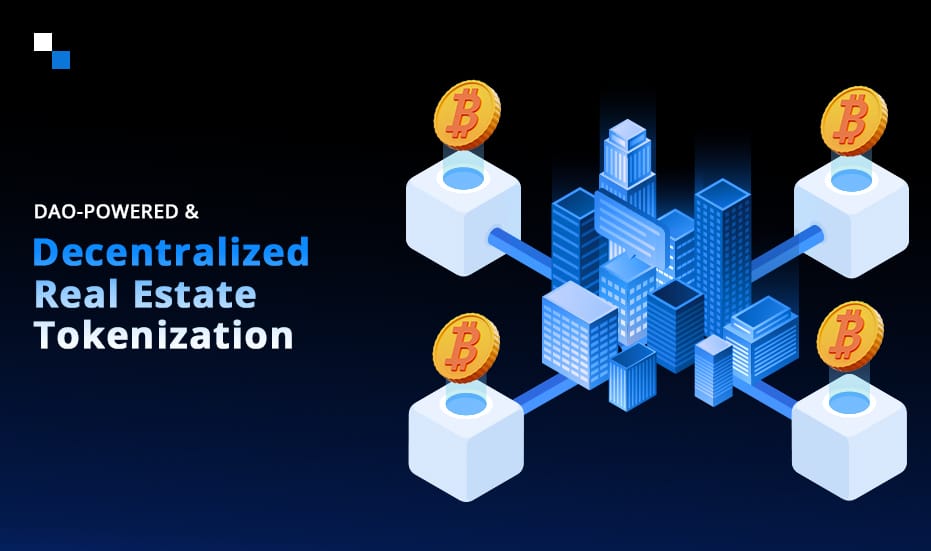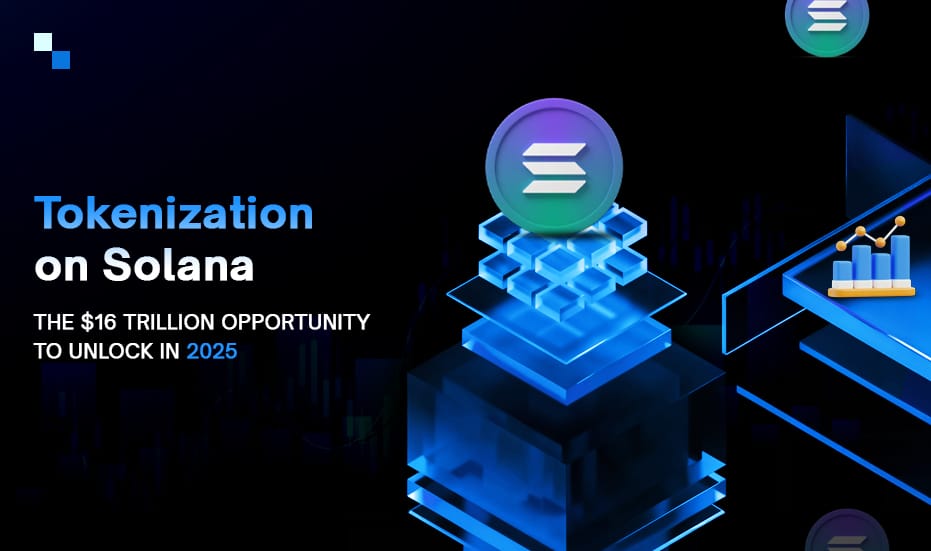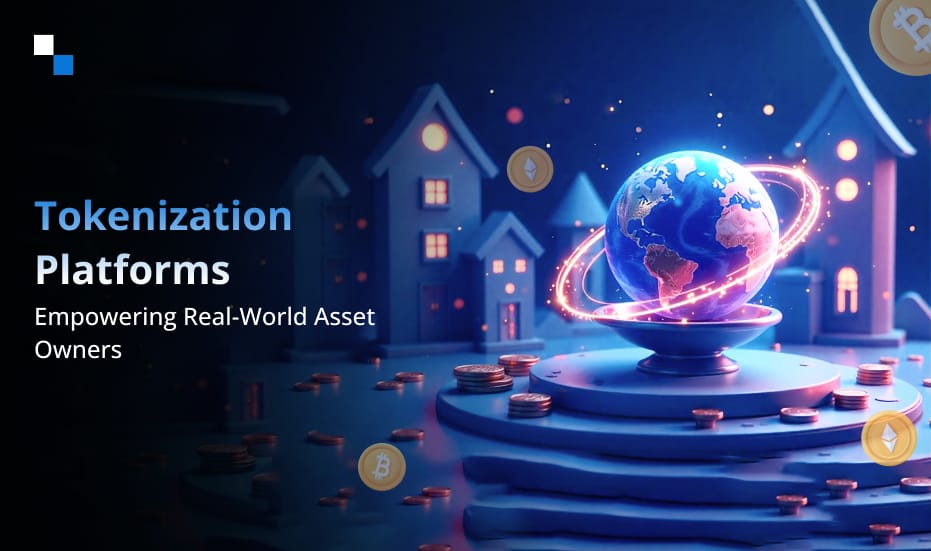
Why Web3 Games Are the Best Engagement Tool for Growing Your Decentralized App User Base
November 22, 2024
Credit Card Tokenization- Ensuring Zero Risk Transactions
November 25, 2024Historically, people have been investing in real estate properties, and it is a pretty profitable way to accrue wealth. Traditional models of property investment unfortunately beset with inefficiencies like participation by intermediaries, heavy transaction costs, and a lack of liquidity. They are also extremely capital-intensive, of very long-time duration, lots of paperwork, and fragmented information. Smart contract real estate solutions help in bringing about greater operational efficiency and transparency with regard to how data is handled on transactions of real estate besides allowing fractional ownership and increased liquidity.
Just imagine, the global commercial real estate market valued USD 7.2 Trillion in 2023. Isn’t it an indication that there is a huge scope in this particular industry? In 2024, the valuation of the real estate tokenization market stood at USD 3.8 billion, with projections indicating a compound annual growth rate (CAGR) of 2.90%, leading to an expected total of USD 26 billion by 2034.
Understanding Real Estate Tokenization
Real estate tokenization development is a process that portrays real estate assets in the form of digital assets on a blockchain. It brings fractional ownership of the real estate asset, and investors can easily buy and sell shares in a particular property. Besides, people can now invest in a high-cost property all around the world that otherwise becomes unapproachable due to the presence of various regulatory and financial restrictions.
The process of real estate tokenization involves the following steps:
Step 1: Property Evaluation and Qualification
The tokenization journey begins with a rigorous property assessment:
- Detailed property valuation
- Comprehensive legal status verification
- Assessment of market potential
- Verification of ownership rights
- Determination of tokenization feasibility
Step 2: Legal and Regulatory Compliance
Critical legal preparation involves:
- Engaging legal experts specializing in blockchain securities
- Conducting thorough compliance reviews
- Obtaining necessary regulatory approvals
- Structuring token offerings to meet securities regulations
- Preparing detailed legal documentation
Step 3: Token Structure Design
Designing the optimal token mechanism:
- Determining token type (fungible/non-fungible)
- Defining fractional ownership percentages
- Establishing a token economic model
- Setting investment minimum and maximum thresholds
- Creating dividend and revenue-sharing mechanisms
Step 4: Blockchain Platform Selection
Choosing the most appropriate blockchain infrastructure:
- Evaluating platforms (Ethereum, Binance Smart Chain)
- Assessing technical capabilities
- Analyzing transaction costs
- Reviewing smart contract compatibility
- Considering scalability and performance
Step 5: Smart Contract Development
The technical implementation phase for developing smart contracts for real estate:
- Coding detailed smart contract specifications
- Implementing ownership transfer protocols
- Developing automated dividend distribution mechanisms
- Embedding regulatory compliance rules
- Integrating KYC/AML verification processes
Step 6: Token Creation and Issuance
Launching the digital asset:
- Minting tokens on selected blockchain
- Creating token standard (ERC-20/ERC-721)
- Establishing initial token pricing
- Developing investment platform
- Setting up secure wallet integration
Step 7: Investor Onboarding and Trading
Enabling investment and liquidity:
- Implementing investor verification processes
- Creating user-friendly investment interfaces
- Listing tokens on compatible exchanges
- Establishing secondary market trading mechanisms
- Providing ongoing investor support and transparency
Step 8: Ongoing Management and Governance
Maintaining the tokenized asset:
- Regular performance monitoring
- Transparent financial reporting
- Managing token holder communications
- Implementing governance protocols
- Ensuring continuous regulatory compliance

The Role of Smart Contracts in Real Estate
Smart contracts are self-executing contracts with terms of agreement written directly in code. In real estate, they offer a myriad of advantages that address many of the traditional challenges faced by property investors and owners.
Smart contracts in real estate facilitate various functions:
- Property Transfers: Such a smart contract would automatically execute the transfer of property ownership when predefined conditions were met. It includes payment confirmation and updating the records on a blockchain.
- Escrow Services: Smart contracts can hold money in escrow until all the terms of a sale are met, where both the buyer and seller should have satisfied their obligations before the actual release of funds.
- Rental Agreements: With smart contracts, rental payments and more conditions can be automated, such as one requesting maintenance or the renewal of a lease. For instance, if the rental property requires some kind of repair or maintenance, the contract can hold the rent until the matter is rectified.
Benefits of Smart Contracts for Real Estate
Smart contracts are fundamentally reshaping the real estate landscape, transforming the very approach to property investment, management, and transactions. Real estate tokenization services harness blockchain technology to build digital agreements that address long-standing challenges in the real estate industry.
1. Unparalleled Transparency
Smart contracts introduce a new era of transparency in real estate transactions:
- Immutable transaction records on blockchain
- Complete visibility of ownership history
- Transparent financial transactions and fee structures
- Real-time access to property-related information
- Elimination of hidden clauses and ambiguous terms
2. Real-Time Verification and Validation
Instantaneous verification mechanisms transform traditional property processes:
- Automatic identity and ownership verification
- Instant document authentication
- Real-time compliance checks
- Immediate transaction validation
- Reduced human error in documentation
3. Significant Cost Reduction
Smart contracts dramatically minimize transaction expenses:
- Elimination of intermediary fees
- Reduced legal and administrative costs
- Automated processing reducing manual labor
- Lower transaction processing expenses
- Minimized risk of costly legal disputes
4. Enhanced Security Mechanisms
Blockchain-powered smart contracts provide robust security features:
- Cryptographic transaction protection
- Decentralized storage preventing single-point failures
- Tamper-proof record-keeping
- Advanced encryption protocols
- Comprehensive access control mechanisms
5. Comprehensive Automation
Smart contracts enable unprecedented process automation:
- Automatic rental income distribution
- Self-executing property transfer protocols
- Programmatic maintenance fund management
- Automated compliance enforcement
- Seamless dividend and revenue sharing
6. Global Investment Opportunities
Breaking traditional geographical barriers:
- Fractional property ownership
- Cross-border investment simplification
- Reduced minimum investment thresholds
- 24/7 global trading capabilities
- Diversification across international markets
7. Streamlined Property Management
Comprehensive management solutions:
- Automated lease agreement execution
- Real-time maintenance request processing
- Digital tenant screening
- Automated utility payment systems
- Integrated financial reporting
Ethereum Smart Contracts and Real Estate
Many blockchains support smart contracts, but Ethereum smart contracts real estate remains the most popular choice among real estate tokenization services. Its robust and versatile functionalities allow developers to create smart contract real estate solutions for executing a variety of real estate transactions and agreements.
Key Advantages of Real Estate Tokenization:
1. Fractional Ownership
- Enables investors to purchase small stakes in high-value properties
- Lowers entry barriers for real estate investment
- Allows diversification across multiple property types and locations
2. Enhanced Liquidity
- Traditional real estate investments are notoriously illiquid
- Tokenized properties can be traded 24/7 on global digital exchanges
- Reduces transaction times from months to minutes
- Eliminates complex intermediary processes
3. Increased Transparency
- Blockchain’s immutable ledger ensures transparent ownership records
- Complete transaction history is permanently documented
- Reduces potential for fraud and dispute
Ethereum- The Preferred Choice for Any Real Estate Tokenization Company
The contribution of Ethereum to real estate tokenization development is valuable for the following reasons:
- Wide Acceptance: Ethereum is the first blockchain platform that provides a base for smart contract development and has been widely used since its inception. It has an established community, infrastructure, and support.
- ERC-20 Standards: The ERC-20 standards for Ethereum provide for easy token creation and management, hence a more efficient approach for real estate applications.
- Smart Contract Capabilities: With smart contracts, Ethereum flexibility encompasses the possibility of putting many real estate functions into one single, seamless process.
Future Outlook
Emerging Trends
1. AI Integration
- Automated property valuation
- Predictive investment analytics
- Dynamic risk assessment
2. Decentralized Finance (DeFi) Convergence
- Advanced lending mechanisms
- Innovative financial products
- Automated investment strategies
3. Enhanced Interoperability
- Cross-platform token exchanges
- Unified investment ecosystems
- Seamless global investment experiences
Conclusion: A Transformative Investment Paradigm
Smart contracts tokenize property, and with that, it changes the face of real estate investment. Apart from allowing fractional ownership, smart contracts in real estate ensure faster transactions and enhanced liquidity, while demarking high-value assets for wider access. Real estate tokenization abolishes the traditional barriers to investing in properties by eliminating the role of intermediaries. It also introduces unprecedented transparency and global opportunity for accessible investment.
Anyone ready to step into the pathway of real estate tokenization development needs to join hands with the right technology partner. Antier is a reputed real estate tokenization company that engineers flawless smart contracts for real estate. Wanna try? Drop a message through our website, and we will get back to you right away.




